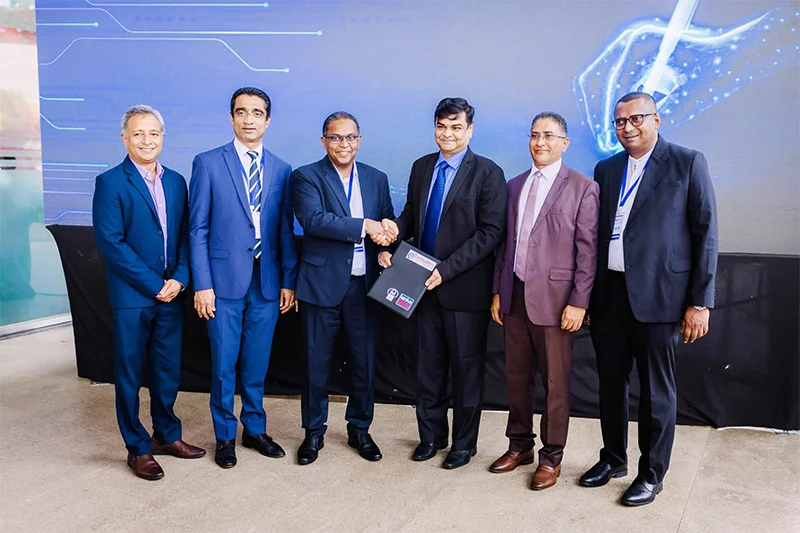Business
MMBL- Pathfinder Group to introduce commercial drone operations

The MMBL-Pathfinder Group, a pioneer investor in the private civil aviation sector in Sri Lanka, through its associate, Pathfinder Capital (Pvt.) Ltd., last week announced it was entering the field of commercial drone operations here.
It said in a news release that having examined the vast array of drones in the market, it had chosen Israel based Airobotics Ltd., which has developed an ideal solution for commercial drone applications, to supply the eqipment necessary for the business.
“The variety of services provided by Airobotics includes perimeter security, HSSE monitoring, emergency response, 2D/3D mapping, survey & analytics, asset inspection etc. Drones developed by Airobotics cover a range of business applications, including public safety, construction, real estate, utilities, ports and airports, and industrial facilities, to name a few,” the release said.
“The management of Pathfinder Capital (Pvt) Ltd will seek to go through the application process with the Civil Aviation Authority of Sri Lanka (CAASL) and work closely with local companies interested in utilizing the state-of-the-art drone system offered by Airobotics Ltd.”
The release explained that airobotics infrastructure allows for fully automated data collection through flights beyond the visual line of sight (BVLOS). This ability to fly remotely enables operators in various industries to operate an aircraft with minimal training or background in aviation.
It added that in homeland security, police officers used the system to reduce response time, in industrial facilities to conduct their inspection work along power lines and railway lines for maintenance work, and in agricultural farmland to observe the health of plantations and check on other aspects of commercial properties.
The release further said drones are usually operated by pilots specially trained for the job. However, with the deployment of advanced technology, autonomous flight capability would render drone operators redundant.
“Airobotics became the first company in the world to receive authorization for unmanned commercial drone operations, granted by the Civil Aviation Authority of Israel way back in 2017. Since then, Airobotics has received regulatory approval for additional countries and has been operating in the US, Singapore and Dubai with multiple clients and rapidly expanding their global unmanned operations. Most recently, Airobotics has entered urban areas and has deployed its infrastructure to fly over millions of people in the UAE,” the release said. It continued:
“Most have heard of drones in the context of military aircraft engaging in warfare or small drones deployed by children and adults alike for recreational purposes. However, drones are increasingly being developed, marketed and used for commercial purposes. It is estimated that since 2012 over US$ 1.5 billion has been invested by commercial drone startups. Looking at the new trends in the drone market, it appears that in the future, drones will represent a significant segment of commercial applications due to their efficiency and capability in gathering and analyzing data.
“With the Covid 19 pandemic sweeping across the world, many countries considered the option of using drones to move medical items required for fighting the pandemic. Sri Lanka Civil Aviation Authority also recognized the utility of drones for surveillance and delivery purposes, revised the regulations that controlled licensing and operation of drones, and invited those interested in registering their drones that could help fight against the pandemic.
“The drone market was expected to grow steadily in the consumer, commercial, and military sectors. In a 2016 report, Goldman Sachs estimated that drone technologies would reach a total market size of $100 billion between 2016 and 2020. The commercial business component of this growth forecast was projected to reach $13 billion. Meanwhile, it was estimated that consumer drone shipments would reach $ 29 million in 2021.
“Practical application of drones includes delivering health-related products and consumer items, mainly the last-mile delivery helping to keep transportation costs low. Another application is drones’ ability to inspect hard to reach places within a fraction of the duration taken by visual inspection undertaken manually. Thus, interested parties could deploy drones for aerial analysis of large construction sites and buildings, pipelines, solar panels, electric grids, commercial plantations, and offshore platforms. The ability of drones to gather high-quality images will save time and money for ports, airports etc., and support perimeter surveillance of large commercial projects.”
Business
Sri Lanka rolls out digital signature framework to accelerate digital economy

Sri Lanka has launched a National Digital Signing Framework, a foundational initiative paving the way for paperless governance. This strategic move eliminates the need for physical signatures and documents in government transactions, aiming to dramatically enhance efficiency, transparency, and accessibility for citizens and businesses. An analyst said that this could accelerate Sri Lanka’s governance and commercial relationships with other countries as traditional signatures make room for digitally signed documents accepted by the government.
In this significant step toward accelerating Sri Lanka’s digital transformation, eMudhra, a global leader in digital identity and security solutions, has entered into a strategic partnership with LankaSign the only Certification Service Provider (CSP) in the country that complies with the Electronic Transactions Act No. 19 of 2006, operated by LankaPay, Sri Lanka’s national payment network during recently held inauguration of INFOTEL 2025 ICT exhibition at Sirimavo Bandaranaike Exhibition Hall.
The LankaSign–eMudhra partnership brings together the strengths of LankaPay’s legally recognized digital signing certificates issued via LankaSign – the pioneering digital Certification Service Provider in Sri Lanka established in 2009 – and eMudhra’s globally trusted emSigner platform, which has enabled secure digital document signing across more than 68 countries since 2008. Through this collaboration, Sri Lankan citizens and businesses will be able to experience a seamless, secure, and user-friendly digital signing solution, enabling documents to be signed anytime, anywhere using iOS, Android, or web-based applications.
This partnership with eMudhra aligns with the national agenda to promote adoption of digital documents, reduce dependency on paper-based processes, and facilitate a more efficient, transparent, and secure digital economy. This collaboration aims to support the government’s long-term digitalization roadmap by enabling a secure digital documentation layer essential for e-government services, digital finance, and digital transformation.
By Sanath Nanayakkare
Business
Dialog & University of Moratuwa launch open-source Sinhala Voice Model

In a significant move to accelerate technological innovation in Sri Lanka, Dialog Axiata PLC, Sri Lanka’s #1 connectivity provider, and the Dialog-University of Moratuwa (UoM) Research Lab, has announced the release of SinhalaVITS, a state-of-the-art, open-source Text-to-Speech (TTS) model for the Sinhala language.
This non-commercial initiative delivers a powerful, high-quality, and natural-sounding Sinhala voice model to the public, making it freely accessible to developers, researchers, and students. The model is available for download on Hugging Face, the world’s largest open-source AI community, empowering anyone to build and experiment with advanced voice technology.
The SinhalaVITS model is the result of a deep-rooted collaboration that unites Dialog’s industry leadership with the academic excellence of the Dialog–UoM Mobile Communications Research Lab, fulfilling a vital need within Sri Lanka’s tech community for accessible, high-performance tools that drive innovation. By removing cost and licensing barriers tied to proprietary software, Dialog is empowering developers and researchers while fostering a more inclusive, collaborative, and future-ready AI ecosystem. This initiative further reinforces Dialog’s commitment to advancing Sri Lanka’s digital future—investing in open-source technology and academic partnerships to nurture local talent and lay the foundation for next-generation digital services built by Sri Lankans, for Sri Lankans.
Business
HNB signals ESG commitment with oversubscribed LKR 10 bn sustainable bonds

The Hatton National Bank PLC (HNB PLC) commemorated raising LKR 10 bn with its first ever issuance of sustainable bonds by way of a market opening ceremony conducted on the trading floor of the Colombo Stock Exchange (CSE) last week.
The 9th December issuance of 100 mn listed, rated, unsecured senior sustainable bonds, in five year and seven-year tenors, with a par value of LKR 100/- and rated “AA-(lka)” By Fitch Ratings Lanka Limited, was oversubscribed on the same day, raising LKR 10 bn.
Sustainable bonds, which were launched in Sri Lanka for the first time this year, are part of a series of GSS+ (Green, Social, Sustainable & Sustainability Linked) debt instruments. The proceeds of the sustainable bond issuance will be used by HNB PLC to fund the development and installation of solar, wind, biomass and hydropower projects, improve energy efficiency through retrofits, fund the construction of recognized ‘green’ buildings, fund investment infrastructure for water treatment, water conservation and efficient agricultural water technologies, finance housing development, healthcare and education for low- and middle-income families, promote women entrepreneurship, amongst others initiatives.
Damith Pallewatte, Managing Director and CEO of HNB PLC, who was the ceremony’s keynote speaker remarked upon the issuance of sustainable bonds commenting: “HNB’s LKR 10 bn sustainable bond issuance is a landmark step in advancing Sri Lanka’s sustainability agenda.”
Delivering his welcome address at the event, Rajeeva Bandaranaike, CEO of CSE, remarked upon rising corporate engagement in CSE’s GSS+ debt instruments stating: “HNB’s Sustainable Bond represents a welcome new addition to the list of leading Sri Lankan financial instruments that have set the example for the success of CSE’s GSS+ Bond framework which have allowed the capital market to operate as a financing vehicle for sustainable and socially equitable projects.”
-

 News1 day ago
News1 day agoMembers of Lankan Community in Washington D.C. donates to ‘Rebuilding Sri Lanka’ Flood Relief Fund
-

 News6 days ago
News6 days agoPope fires broadside: ‘The Holy See won’t be a silent bystander to the grave disparities, injustices, and fundamental human rights violations’
-

 News6 days ago
News6 days agoPakistan hands over 200 tonnes of humanitarian aid to Lanka
-

 Business5 days ago
Business5 days agoUnlocking Sri Lanka’s hidden wealth: A $2 billion mineral opportunity awaits
-

 News5 days ago
News5 days agoArmy engineers set up new Nayaru emergency bridge
-

 News6 days ago
News6 days agoOfficials of NMRA, SPC, and Health Minister under pressure to resign as drug safety concerns mount
-

 News6 days ago
News6 days agoExpert: Lanka destroying its own food security by depending on imported seeds, chemical-intensive agriculture
-

 Editorial6 days ago
Editorial6 days agoFlawed drug regulation endangers lives













